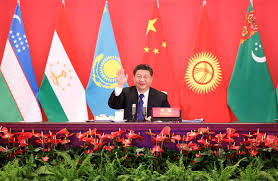
ISLAMABAD, May 22 (INP): Central Asia is striving to transform to realize the dream of sustainable development. It is putting efforts to achieve the lost glory, which Central Asia enjoyed during the days of the ancient Silk Road, according to an article carried by Gwadar Pro on Monday
However, connectivity, lower industrial development, poverty and lack of financial resources are hindering the transformation and realization of dreams of sustainable development.
Thus, Central Asia is looking for friends and partners, which can help Central Asia overcome these problems and put the region on the path of development. In this context, the China-Central Asia Summit held on May 18 and 19 was dubbed as a game changing opportunity for Central Asia.
The summit has all the elements that can help Central Asia move on the path of prosperity. First, the cooperation to help Central Asia overcome the challenge of connectivity was proposed.
There is no second opinion that China through Belt and Road Initiative can help Central Asia solve the problem of connectivity. Two corridors of BRI – CCAWAC and CPEC – are the best options available for this purpose. Besides, China is working to enhance the traffic capacity of China-Kyrgyzstan-Uzbekistan and China-Tajikistan-Uzbekistan highways. China also supported the trans-Caspian international transport corridor, which is considered a new beginning to develop BRI’s linkages with other initiatives. Lastly, China emphasized the importance of expediting the China-Kyrgyzstan-Uzbekistan railway project.
Thus, it is hoped that Central Asia will transit from landlocked country to land linked country. It will help Central Asia play the role of connecting nod between the East and the West, as it was playing during the times of the ancient Silk Road.
Second, China has shown keen interest in helping Central Asia tackle issues of development and poverty. China announced that China will formulate the China-Central Asia special cooperation program for poverty reduction in the region. China also kicked start the implementation of the “China-Central Asia technology and skills improvement scheme”.
It is an innovative approach, which will not only help eradicate poverty but also prepare future generations for the fourth industrial revolution. Also China will provide Central Asian countries with a total of 26 billion yuan (about 3.7 billion U.S. dollars) in financing support and grants.
Third, China will be working with Central Asia to implement a green development agenda, high-quality development vision and tackle environmental and climate change issues. China will help develop and modernize industrial and agricultural sectors in Central Asia.
For that purpose, special efforts will be made to recover saline-alkali land and make them productive. Cooperation will also be extended in the field of water management and better utilization of available resources. China will build a specialized agriculture laboratory by keeping in mind the needs of Central Asia.
On environmental dimensions, special efforts will be made to tackle the ecological crisis of the Aral Sea. It would be a landmark step, as Aral Sea improvement will bring a new era of development for regional countries. For future oriented development, China will support the establishment of high-tech parks and more cooperation in the field of IT.
Fourth, energy cooperation will be enhanced, and China has proposed establishing a China-Central Asia energy development partnership. It focuses on traditional sources of energy like gas, oil and new sources of energy like wind, solar , etc. China is willing to expedite work on the China-Central Asia Gas pipeline and improve the industrial chain of energy. Besides, China is extending cooperation on renewable and nuclear energy, which will help Central Asia fulfill its agenda of sustainable development and commitments of SDGs 2030.
Thus, cooperation in energy will not be a one-way traffic. Rather, it will be a two-way traffic and would be equally beneficial for China and Central Asia.
Fifth, China has shown a strong commitment to ensuring peace and development in the region. China has offered comprehensive cooperation to fight terrorism, separatism and extremism.
It is direly needed, as some Central Asian States are facing problems from western interference. China has also offered to build capacity for law enforcement, security and defense of Central Asian States and work in new areas of security like cyber security. Besides, it was identified that Afghanistan peace is direly needed, and it has direct relevance for Central Asia.
Sixth, the best part of the proposal is that China has proposed to build institutional mechanisms to strengthen cooperation. It is a common fact that without a permanent institutional framework cooperation can neither prosper nor be sustainable.
From the discussion, we can draw three conclusions. First, China has proposed and adopted a win-win formula for cooperation. China did not try to exploit the situation and extract maximum benefits for itself. China tries to be fairer and just. Second, proposed areas of cooperation indicate that the proposal for cooperation is comprehensive.
It includes all the important areas like development, security and the environment , etc. Third, China did not try to interfere with or lecture the Central Asian States. It only focuses on the needs of Central Asian States.
Thus, China’s proposal is dubbed as a practical example of a new type of international relation philosophy. Owning to these factors, it is hoped that cooperation will go a long way and bring peace and prosperity for relevant parties.































































































